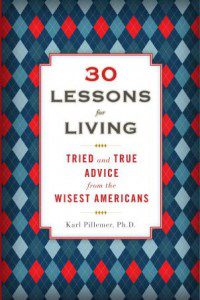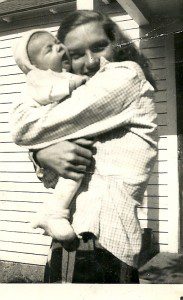Today’s guest blog comes from Dr. Karl Pillemer, author of 30 Lessons for Living: Tried and True Advice from the Wisest Americans. Enjoy!
 A perennial question is: What makes us happy? Indeed, there’s so much interest in this topic that a veritable torrent of books have been published over the past few years on the “how to be happy” theme. Despite all the advice, people often struggle to maintain a positive attitude in the face of the challenges, losses, and stress life throws at us.
A perennial question is: What makes us happy? Indeed, there’s so much interest in this topic that a veritable torrent of books have been published over the past few years on the “how to be happy” theme. Despite all the advice, people often struggle to maintain a positive attitude in the face of the challenges, losses, and stress life throws at us.
I’ve spent the last six years conducting a series of surveys that ask older people (mostly age 70 and beyond) to offer their “lessons for living” to younger people. Using a variety of methods, we’ve asked over 1200 older Americans to share their thoughts on the question: “As you look back over your life, what are the most important lessons you have learned that you would like to pass on to younger people?” And many of the elders offered this piece of advice: Strive intentionally to maintain a positive attitude every day.
Sifting through hundreds of pages of responses, one quote leaped out that summed up the view of the elders: “In my 89 years, I’ve learned that happiness is a choice, not a condition.”
Most of our respondents reported the same lesson. Keep in mind that everyone who reaches old age has lived through loss, illness, and disappointment. Nevertheless, the overwhelming opinion is that people need to make a daily, conscious decision to maintain a positive attitude. Based on their life experience, they exhort us to take charge and to assume control – not over what happens to us, which is often impossible – but over our own attitude toward happiness.
Fortunately, they don’t just offer this as a general platitude. The elders had some specific tips they wanted to share. Here are some of them.
Eliminate unnecessary worrying. Over and over as they reflected on their lives, I heard versions of “I wish I’d spent less time worrying” and “I regret that I worried so much about everything.” Indeed, from the vantage point of late life, many people felt that if given a “do-over” in life, they would like to have all the time back they spent poisoning the present moment with fruitless rumination about the future. As John, 83, put it: “Don’t believe that worrying will solve or help anything. It won’t. So stop it.” Doesn’t get much clearer than that.
Focus on the short term rather than the long term. To stay positive, the elders suggest you focus on the short term; many endorsed the idea of dealing with immediate problems rather than spinning endless “what-ifs” in your head. When a centenarian gives advice, I tend to listen, and here’s what Eleanor, 102, told me: “Well I think that if you worry, and you worry a lot, you have to stop and think to yourself, “This too will pass.” So the most important thing is one day at a time. You can plan ahead but it doesn’t always work out.”
Acceptance. The elders told me that acceptance isn’t purely passive; rather, it’s something we can actively foster. They recommend actively working toward acceptance of problems and limitations as a key to a positive attitude. Sister Clare, 98, is a very wise nun. She shared a technique for reducing worry through pursuing acceptance – saying to herself “let it be.” She told me: “So many things come to your mind, for instance somebody might hurt your feelings, you’re going to get back at him or her, well – just let it be. Push it away. Some people get on your nerves and they will be there until you die. Let it be. Often, before I say anything, I think ‘If I did that, then what?’ And let it be.”
Savoring. When people seek happiness, they often think about “big-ticket” items: buying a house, finding a partner, having a child, getting a new job, making more money. The elders tell us that a positive attitude depends on thinking small: the morning cup of coffee, a warm bed on a winter night, a brightly colored bird feeding on the lawn, an unexpected letter from a friend, even a favorite song on the radio (all pleasures mentioned in my interviews). Ursula suffered immense hardship as a child in Hitler’s Germany. Her advice: “I think the most important thing I learned was not to take things for granted. You cannot be entirely prepared for what will happen to you in life, but I learned that despite everything that happened, life is worth living and you can enjoy every day especially because of the little things in life. You can have joy, even if the big things go wrong.”
Finally, many of the elders believe that young people can benefit from this advice. Some respondents told me that they wish they had learned to make a positive attitude a conscious choice, to practice acceptance, and to savor the small stuff earlier in life. As Malcolm, 70, told me: “It seems to take a lifetime to learn how to live in the moment, but it shouldn’t. I wish I could have learned this in my 30s rather than in my sixties. It would have given me decades more to enjoy life in this world.”
 After a chance encounter with a remarkable 90-year old woman, Dr. Pillemer decided to find out what older people know about life that the rest of us don’t. His quest led him to ask more than a thousand older Americans their advice for living. He asked about all the big issues – love, marriage, children, work, happiness, avoiding regrets. This 6-year project led to the book: 30 Lessons for Living: Tried and True Advice from the Wisest Americans.
After a chance encounter with a remarkable 90-year old woman, Dr. Pillemer decided to find out what older people know about life that the rest of us don’t. His quest led him to ask more than a thousand older Americans their advice for living. He asked about all the big issues – love, marriage, children, work, happiness, avoiding regrets. This 6-year project led to the book: 30 Lessons for Living: Tried and True Advice from the Wisest Americans.


